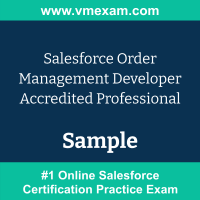 We have prepared Salesforce Order Management Developer Accredited Professional certification sample questions to make you aware of actual exam properties. This sample question set provides you with information about the Salesforce Order Management Developer exam pattern, question formate, a difficulty level of questions and time required to answer each question. To get familiar with Salesforce Order Management Developer Accredited Professional exam, we suggest you try our Sample Salesforce Order Management Developer Certification Practice Exam in simulated Salesforce certification exam environment.
We have prepared Salesforce Order Management Developer Accredited Professional certification sample questions to make you aware of actual exam properties. This sample question set provides you with information about the Salesforce Order Management Developer exam pattern, question formate, a difficulty level of questions and time required to answer each question. To get familiar with Salesforce Order Management Developer Accredited Professional exam, we suggest you try our Sample Salesforce Order Management Developer Certification Practice Exam in simulated Salesforce certification exam environment.
To test your knowledge and understanding of concepts with real-time scenario based questions, we strongly recommend you to prepare and practice with Premium Salesforce Order Management Developer Certification Practice Exam. The premium certification practice exam helps you identify topics in which you are well prepared and topics in which you may need further training to achieving great score in actual Salesforce Order Management Developer Accredited Professional exam.
Salesforce Order Management Developer Sample Questions:
Answers:
|
Question: 01 Answer: a, b |
Question: 02 Answer: c |
Question: 03 Answer: b |
Question: 04 Answer: a |
Question: 05 Answer: c, d |
|
Question: 06 Answer: d |
Question: 07 Answer: a, c |
Question: 08 Answer: a |
Question: 09 Answer: b, c |
Question: 10 Answer: b |
Note: Please update us by writing an email on feedback@vmexam.com for any error in Salesforce Order Management Developer Accredited Professional certification exam sample questions
